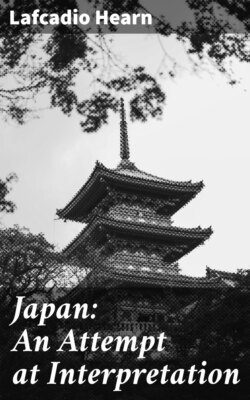Читать книгу Japan: An Attempt at Interpretation - Lafcadio Hearn - Страница 3
На сайте Литреса книга снята с продажи.
CHAPTER PAGE I. DIFFICULTIES…………………….1 II. STRANGENESS AND CHARM…………….5 III. THE ANCIENT CULT………………..21 IV. THE RELIGION OF THE HOME…………33 V. THE JAPANESE FAMILY……………..55 VI. THE COMMUNAL CULT……………….81 VII. DEVELOPMENTS OF SHINTO………….107 VIII. WORSHIP AND PURIFICATION………..133 IX. THE RULE OF THE DEAD……………157 X. THE INTRODUCTION OF BUDDHISM…….183 XI. THE HIGHER BUDDHISM…………….207 XII. THE SOCIAL ORGANIZATION…………229 XIII. THE RISE OF THE MILITARY POWER…..259 XIV. THE RELIGION OF LOYALTY…………283 XV. THE JESUIT PERIL……………….303 XVI. FEUDAL INTEGRATION……………..343 XVII. THE SHINTO REVIVAL……………..367 XVIII. SURVIVALS……………………..381 XIX. MODERN RESTRAINTS………………395 XX. OFFICIAL EDUCATION……………..419 XXI. INDUSTRIAL DANGER………………443 XXII. REFLECTIONS……………………457 APPENDIX………………………481 BIBLIOGRAPHICAL NOTES…………..487 INDEX…………………………489
Оглавление"Perhaps all very marked national characters can be traced back to a time of rigid and pervading discipline"—WALTER BAGEHOT.
[1] DIFFICULTIES
A thousand books have been written about Japan; but among these,—setting aside artistic publications and works of a purely special character,—the really precious volumes will be found to number scarcely a score. This fact is due to the immense difficulty of perceiving and comprehending what underlies the surface of Japanese life. No work fully interpreting that life,—no work picturing Japan within and without, historically and socially, psychologically and ethically,—can be written for at least another fifty years. So vast and intricate the subject that the united labour of a generation of scholars could not exhaust it, and so difficult that the number of scholars willing to devote their time to it must always be small. Even among the Japanese themselves, no scientific knowledge of their own history is yet possible; because the means of obtaining that knowledge have not yet been prepared,—though mountains of material have been collected. The want of any good history upon a modern plan is but one of many discouraging wants. Data for the study of sociology [2] are still inaccessible to the Western investigator. The early state of the family and the clan; the history of the differentiation of classes; the history of the differentiation of political from religious law; the history of restraints, and of their influence upon custom; the history of regulative and cooperative conditions in the development of industry; the history of ethics and aesthetics,—all these and many other matters remain obscure.
This essay of mine can serve in one direction only as a contribution to the Western knowledge of Japan. But this direction is not one of the least important. Hitherto the subject of Japanese religion has been written of chiefly by the sworn enemies of that religion: by others it has been almost entirely ignored. Yet while it continues to be ignored and misrepresented, no real knowledge of Japan is possible. Any true comprehension of social conditions requires more than a superficial acquaintance with religious conditions. Even the industrial history of a people cannot be understood without some knowledge of those religious traditions and customs which regulate industrial life during the earlier stages of its development …. Or take the subject of art. Art in Japan is so intimately associated with religion that any attempt to study it without extensive knowledge of the [3] beliefs which it reflects, were mere waste of time. By art I do not mean only painting and sculpture, but every kind of decoration, and most kinds of pictorial representation,—the image on a boy's kite or a girl's battledore, not less than the design upon a lacquered casket or enamelled vase,—the figures upon a workman's towel not less than the pattern of the girdle of a princess,—the shape of the paper-dog or the wooden rattle bought for a baby, not less than the forms of those colossal Ni-O who guard the gateways of Buddhist temples …. And surely there can never be any just estimate made of Japanese literature, until a study of that literature shall have been made by some scholar, not only able to understand Japanese beliefs, but able also to sympathize with them to at least the same extent that our great humanists can sympathize with the religion of Euripides, of Pindar, and of Theocritus. Let us ask ourselves how much of English or French or German or Italian literature could be fully understood without the slightest knowledge of the ancient and modern religions of the Occident. I do not refer to distinctly religious creators,—to poets like Milton or Dante,—but only to the fact that even one of Shakespeare's plays must remain incomprehensible to a person knowing nothing either of Christian beliefs or of the beliefs which preceded them. The real mastery of any European tongue is impossible [4] without a knowledge of European religion. The language of even the unlettered is full of religious meaning: the proverbs and household-phrases of the poor, the songs of the street, the speech of the workshop,—all are infused with significations unimaginable by any one ignorant of the faith of the people. Nobody knows this better than a man who has passed many years in trying to teach English in Japan, to pupils whose faith is utterly unlike our own, and whose ethics have been shaped by a totally different social experience.
[5]
